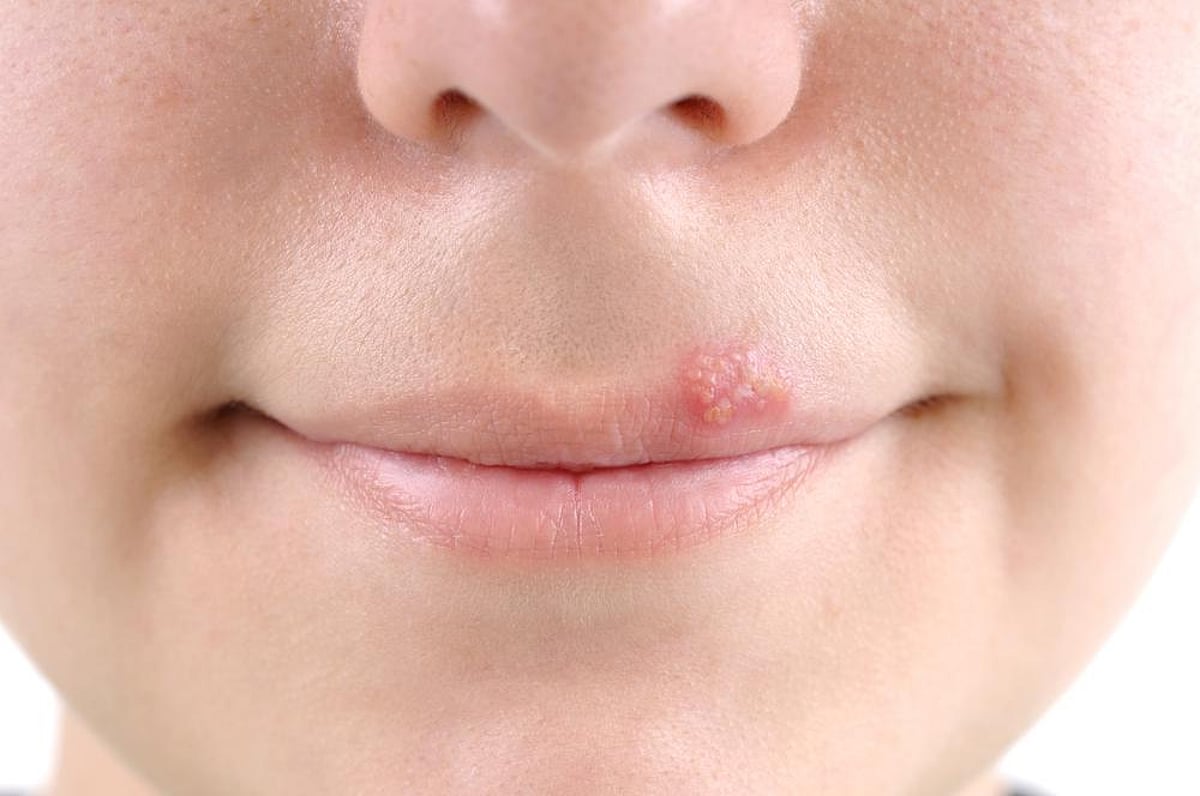Cold Sores (Children)

What are cold sores?
Cold sores, also known as fever blisters, are small red blisters that crop up near the lips or on them. More rarely, they sprout on the roof of the mouth. (Some people confuse them with canker sores, which are painful crater-like sores that appear on the tongue or on the inside of the cheeks.) Despite their name, cold sores actually have nothing to do with colds; they're caused by the herpes simplex virus type 1 (HSV-1), a close relative of the virus that causes genital herpes.
How do you get cold sores?
Most children pick up the virus by sharing food with or kissing someone who has a cold sore. They can also get the infection from someone who doesn't have a visible sore but has the virus in his or her saliva. Once you contract the virus, it stays in your body for good, hiding in nerve cells near your ear. In some people, the virus lies dormant and never causes harm. In others, it periodically wakes up and triggers cold sores. Nobody knows what stirs the virus into action, but stress, fever, colds, and sunburn seem to encourage outbreaks.
What are the symptoms?
Children don't develop cold sores immediately after the first time they catch the virus. Instead, your child may have swollen gums and a sore feeling in the mouth. A few days later, you may see a cluster of small blisters that turn into a shallow, painful sore, possibly accompanied by fever and swollen lymph glands in the neck. In a few days the sore will crust over and slowly disappear. The whole flare-up lasts about seven to 10 days.
What's the best way to treat cold sores?
Cold sores will go away on their own, but there are some things you can do to help your child feel better in the meantime.
- To ease the pain, apply ice to the sore or give your child a mild pain reliever, such as ibuprofen or acetaminophen. (Never give aspirin to children or teenagers; it may trigger Reye's syndrome, a rare but potentially life-threatening illness.)
- Have your child avoid salty, spicy, and sour foods, which irritate the raw nerves in the sore.
- Dab on a water-based zinc ointment. It helps dry out the sore so it can heal faster, and softens the skin to prevent cracking.
- To help with pain relief use a topical cream like lidocaine or benzyl alcohol.
To keep your child from infecting other parts of his body or giving the virus to someone else, encourage him to wash his hands regularly and keep him from picking at his sores. Be sure to immediately launder any washcloths or towels you used to wipe his lips or a part of the body with a cold sore; otherwise, the towel or washcloth could spread the infection to someone else in the family.
One last caution: Urge your child to avoid touching his eyes when he has a cold sore. HSV-1 can cause ocular herpes, a serious eye infection. If your child develops a painful sore on his eyelid or the surface of his eye, schedule a prompt appointment with his pediatrician: Your child may need antiviral drugs to keep the infection from scarring his cornea. In rare cases, ocular herpes can weaken vision and even cause blindness.
Also, any kind of herpes virus is dangerous to newborns. If you have a newborn, keep any of your children who have a cold sore away from him until it's healed.
How can I prevent cold sores?
The first thing you can do is try to keep your child free of the virus that causes cold sores, which may be difficult, given how contagious HSV-1 is. Remember, one peck with an infected lip is all it takes to pass on the virus. If you have sores and your child doesn't, cut out kissing until you've healed.
If you are the parent of a newborn and have a cold sore, you don't need to separate yourself from your new baby. Do wash your hands frequently, though, and avoid kissing your baby until the cold sore goes away. You may consider wearing a surgical mask to cover the sore as well. Infectious disease experts do recommend that women with herpes sores on their breasts refrain from breast feeding until the sores are healed.
If your child already has the virus, the best thing you can do is keep his immune system strong by making sure he gets a healthful diet, plenty of sleep, and regular exercise. Also avoid triggers that may stress your child's body such as getting a cold or flu.
You should protect your child from the sun as well. If he ventures outside on a sunny day, slather him with sunscreen and put on a lip balm that contains sunblock.
References
The Self-Care Advisor: The Essential Home Health Guide for You and Your Family, Time Life.
Mayo Clinic. Cold Sore. https://www.mayoclinic.org/diseases-conditions/cold-sore/symptoms-causes/syc-20371017
US Pharmacist. Preventing and Treating Cold Sores. https://www.uspharmacist.com/article/preventing-and-treating-cold-sores#:
Related Posts
Traveling Overseas? Follow This Health Checklist
SUNDAY, May 8, 2022 (HealthDay News) -- As summer approaches, you may be...
Traveler’s Diarrhea: Symptoms & How to Get Relief
WEDNESDAY, June 14, 2023 (HealthDay News) -- A bout of traveler's diarrhea can...
Updated Infant Sleep Guidelines: No Inclined Products, Bed-Sharing
TUESDAY, June 21, 2022 (HealthDay News) -- New infant sleep guidelines from the...
As Holidays Return to Normal, Here’s How to De-Stress
FRIDAY, Nov. 26, 2021 (HealthDay News) -- A return to a more normal holiday...
